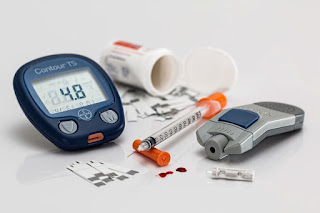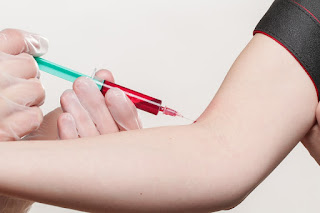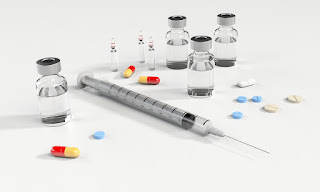DIABETES MELLITUS (DM)
It is a metabolic disorder
characterized by hyperglyceama, glycosuria, hyperlipaemia nitrogen
balance and
sometimes ketonaemia. A widepread pathological change is thickening of
capillary
basement membrane increase in vesel
wall matrix and cellular profiferation resulring in
vascular
comprosis ,
sclerosis of glomerular capillaries , retinopathy, neuropathy and peripheral
vascular insufficiencly.
 |
| GLUCAGON METER |
TYPES
Type
I:- Insulin dependent diabetes
mellitus (IDDM) , juvenile onset diabetes mellitus. There
is beta cell destruction in pancreatic
isles majority of cases are autoimmune antibiotic that
destroy beta cells are
detectable in blood. but some are idiophathic
no beta cell antibiotic is
found . in all type 1 cases circulating
insulin levels are low or very low , and
patients are more
proneto ketosis. This type is less common and has a low
degree of genetic predisposition.
Type
2:- Noninsulin dependent diabetes mellitus (NIDDM), Maaturity onset
diabetes mellitus.
There is no loss or modarate reduction in beta cell mass, no
anti beta antibody is demonstrable
has a high degree of genetic predisposition
generally has a late onset
INSULIN
 |
| insulin |
Insulin was discovered in 1921
by Bnting and best who demonstrated the hypoglycaemic action
of an extract of
pancreas prepared after degeneration of the exocrine part due to ligatiion of
pancreatic duct.
ASSAY
OF INSULIN:- Insulin is
bioassayed by measuring blood sugar
depression in rabbits
or by its potency to induce hypoglycaemic convulsions in
mice . 1 mg of the international
standard of insulin= 28 units. With the
availability of pure preparations insulin can be assayed
chemically also. Plasma
insulin can be measured by radioimmunoassay or enzyme
immunoassay.
NOTE :-
Under basal condition –IU insulin il
secreted per hour by human pancreas. Secretion
of insulin from beta cells
is regulated by chemical, hormonal and neural mechanism.
NEWER INSULIN DELIVERY DEVICES
 |
| pump insulin |
A number of innovation have been
made to improve ease and accuracy of insulin
administration as well as to
achieve tight glycaemia control.
These are:
1.
INSULIN SYRINGES :-
Prefilled disposible syringes specifiC types
or mixtures of regular and modified insulin .
2.
PEN
DEVICES :- Fountain pen like
use insulin catridges for s.c. injection through a needle.
3.
INHALED
INSULIN :- Recently an inhaled human
insulin preparation has bee marked in Europe and USA. The fine powder is delivered through a nebulizer, absorption
is rapid . peak action accurs at 2 hours and duration of action is 6-7 hours.
4.
INSULIN PUMPS:- Portable infusion device connected to
a subcutaneously placed cannula provide continuous S.C.INSULIN only
regular insulin is used
5.
IMPLANTABLE
PUMPS:- Mechanical pumps fluorocarbon propellant and osmotic are being developed.
6.
EXTERNAL
ARTIFICIAL PANCREAS:- This is microprocessor controlled
device connected
through i.v. lines which measures blood glucose and then infuses
appropriate amounts of insulin in a
continuous feedback manner.
ORAL HYPOGLYCAEMIC DRUGS
These drugs lower blood glucose levels snd are effective orally. The chief
draw back of
insulin is it must be given by
injection .
1. SULFONYLUREAS:- All have similar
pharmacological profile sole gnificant action being lowering of blood glucose
level in normal subjects and in type 2 diabetics.
FIRST GENERATION
1.
Tolbutamide
2.
chlorpropamide
SECOND GENERATION
1.
Glibenclamide
2.
Glipizide
3.
Gliclazide
4.
Glimepiride
3.
BIGUANIDES:-
Two biguanides antidiabetics phenformin and metformin were
introduced in the
1950s. because of higher risk of lactic acidosis , phenforming was
withdrawn in many countries and has been banned in india since 2003.
1. Metformin
4.
MEGLITINIDE
:-These are recently developed quick and short acting insuli
releases.
1.
Repaglinide
2. Nateglinide
5.
THIAZOLIDINEDIONES:-
This novel class of oral antidabetic drugs.
1. Rosiglitazone
2. Pioglitazine
6.
alpha GLUCOSIDASE
INHIBITORS
1. Acarbose
2. Miglitol
 |
| insulin syringe |
GLUCAGON
A hyperglycaemic principle was demontrated
to be present in the pancreatic islets
judt two year after the discovery of insulin
in 1921. It was named “ GLUCAGON”.
USES
1.
HYPOGLYCAEMIA
2.
CARDIOGENIC
3.
DIAGNOSIS
OF PHEOCHROMOCYTOMA



0 comments:
Post a Comment